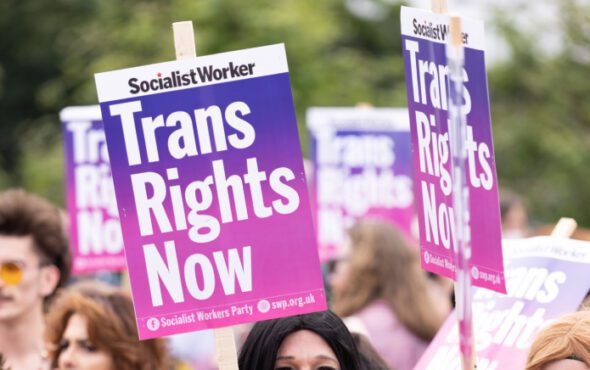
One of the UK’s largest human rights bodies called on the Scottish government to pause plans to simplify the gender recognition process.
Ministers in the country are currently seeking to update the system in order to make changing someone’s legally recognised gender a smoother process – with a bill expected at Holyrood sometime in 2022.
The Equality and Human Rights Commission (EHRC), which aims to promote and uphold equality laws in the UK and is funded by the UK government’s Equalities Office, suggested to Shona Robison (the Social Justice Secretary who is overseeing the proposed changes) in a letter on 26 January that “more detailed consideration” was required – despite the government already conducting two consultations on the plans.
Chairwoman of the EHRC Baroness Kishwer Falkner agreed that “urgent improvements to gender identity services throughout Britain” are needed, though expressed her concerns over “those relating to the collection and use of data, participation and drug testing in competitive sport, measures to address barriers facing women and practices within the criminal justice system”.
She continued: “The established legal concept of sex, together with the existing protections from gender reassignment discrimination for trans people and the ability for them to obtain legal recognition of their gender, collectively provide the correct balanced legal framework that protects everyone.”
We have written to the Scottish Government today about reform of the Gender Recognition Act.
Download and read our full letter here ⬇️https://t.co/nvQXr457vn
— EHRC (@EHRC) January 26, 2022
The Scottish government swiftly responded to the letter and stated: “Our proposals to reform the current Gender Recognition Act do not introduce any new rights for trans people or change single sex exceptions in the Equality Act.
“Our support for trans rights does not conflict with our continued strong commitment to advance equality and to protect and uphold women’s rights.”
First Minister Nicola Sturgeon said that although “some have sincerely held concerns” about the topic, the reform would “make the existing process of gender recognition less degrading, intrusive and traumatic.”
“In other words, it will make life that bit easier for one of the most stigmatised minorities in our society,” she continued. “What it will not do is remove any of the legal protections that women currently have.”
Stonewall called the EHRC’s intervention “an attack on trans equality” and urged the Prime Minister and First Minister to “continue showing leadership to recognise and protect trans people, and progress rights for our communities by supporting these key pieces of legislation.”
“We are deeply troubled by the approach that the EHRC is taking to trans people’s human rights. Their approach appears to focus on pleasing a noisy minority of anti-trans activists, rather than promoting human rights for all LGBTQ+ people,” the statement continued.
Today’s statements from the Equality and Human Rights Commission (@EHRC) are an attack on trans equality and undermine their core purpose of regulating, promoting and upholding human rights.
(1/6)— Stonewall (@stonewalluk) January 26, 2022
The LGBT Foundation, a charity supporting the community, severed all ties with the EHRC as a result of Baroness Falkner’s letter.
Part of its statement read: “EHRC has ignored the experiences of trans and non-binary individuals who have undergone unnecessary trauma. They suggest that LGBTQ+ lives are up for debate and medical scrutiny. They disregard expert opinion and lived experience – a humiliating and dehumanising action against our community with real-world consequences.
“EHRC should exist to regulate, promote, and uphold human rights, and we believe it is no longer fit for purpose. Our position from today is clear: EHRC can no longer call itself a true human rights organisation.”
Trans charity Mermaids said “it’s bitterly disappointing to see the EHRC seek to elongate what has been an exhausting and upsetting period of time for our community” and shared that it has faith in Scotland to deliver “strong leadership” on the issue.
Tim Hopkins, Director of the Equality Network, questioned how independent the EHRC is of the UK government given that it put aside similar plans for gender recognition reform in 2020.
He said: “Its board is directly appointed by Liz Truss and the UK government … We do not need UK government appointees telling us in Scotland how to legislate in devolved areas, and we look forward to the Scottish government proceeding with this legislation soon.”
The first of the Scottish government’s consultations on its plans was held in 2018 and garnered 15,697 responses and the second lasted from 2019 to 2020, receiving 17,058 entries.
Statement: LGBT Foundation to sever all ties with the EHRC – Our response to EHRC statements on upcoming LGBTQ+ legislation. https://t.co/1Ho11f5cEp pic.twitter.com/7Dqy08MLFt
— LGBT Foundation (@LGBTfdn) January 26, 2022



